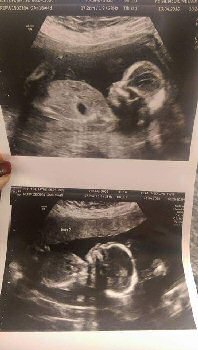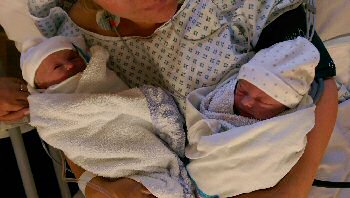Liverpool mum speaks out on
lifesaving scheme after twins operated on in womb

A Liverpool Hospital has become the 1st in the North West to support the TTTS Registry; a new scheme aimed at
saving the lives of unborn twins.
Multiple births charity Tamba has partnered with 9 fetal medicine centres in the
UK, including Liverpool Women's Hospital, to set up the Registry. Leading Clinicians, at the
Hospital, are now entering data into the TTTS (twin to twin
transfusion syndrome) Registry about families who are diagnosed with the
devastating condition.
Liverpool Women's NHS Foundation Trust is the only centre in the North West
supporting the Registry and from 2017 will also be offering laser ablation; a highly specialist procedure in which
Doctors perform surgery on the twins'
placenta while they are still in the womb.
It's hoped the data collected will help improve TTTS outcomes in future and save
more families from its life changing effects.
Dr Surabhi Nanda is a Consultant in Maternal Fetal Medicine at Liverpool Women's
NHS Foundation Trust. Hers is 1 of the oldest dedicated multiple pregnancy
clinics in England and is also the model used in the NICE guidelines on
multiple births.
Dr Nanda and her team help multiple families from a wide area spreading from
Liverpool to Lancaster, the Isle of Man, North Wales and up as far as Crewe. She
said:- "Not only have we joined the TTTS Registry, but next year we are
hoping to offer laser ablation too, so our patients don't have to travel to
centres in Birmingham and London for the procedure.
We have monthly twin evenings where we explain to women with multiple
pregnancies what TTTS is and how the Registry works, so they know they have a
lot of support.
By joining the Registry, we hope to be able to monitor what the long-term
outcomes are for our patients. In future we will be able to use the data to
advise them on the incidences of TTTS and compare our own local statistics to
the national standard.
I think the Registry is an absolutely brilliant concept. I'm really excited to
be working on a project which will hopefully achieve our goal of reducing TTTS
mortalities."

The rare and often devastating condition of
TTTS occurs in about 10% to 15% of monochorionic (identical) twin pregnancies. It
also affects higher multiple pregnancies which include monochorionic twins. If
left untreated, 90% of these babies will die. Even with treatment, there is only
up to a 70% chance of both babies surviving. Of those that do survive, there is
a chance they will suffer from a disability or health condition.
The condition occurs when blood passes from 1 twin (the donor) to the other
baby (the recipient). In most cases the donor twin becomes smaller and anaemic.
They also usually have a reduced amount of amniotic fluid and can become 'stuck'
to the side of the uterus. The recipient baby becomes bigger and the higher
blood volume puts a strain on their heart.
Dr Matthew Jolly, National Clinical Director for Maternity Review and Women's
Health at NHS England, said:- "I'm delighted to see the TTTS Registry
is now underway. Recording accurate data on high risk multiple pregnancies will
be key to improving outcomes for multiple birth families in the future. I hope
even more Hospitals across the country sign up to the registry and look forward
to many of the remaining clinical dilemmas being answered."
The TTTS Registry was officially launched in November 2015; the 1st of its kind
in the UK. Now 9 centres are actively using the service, including:- 4 Hospitals
in London, 1 in Northern Ireland and 1 in Scotland.
Tamba (Twins and Multiple Births Association) is also keen to expand the project
and see the Registry rolled out to other Hospitals which perform both maternity
and neonatal services.
Keith Reed, Tamba's CEO, said:- "Although we've had a great 1st year and
we are really pleased with the number of fetal medicine centres using the
Registry, we are still only skimming the surface in terms of the data we could
potentially be collecting.
In order to build the best possible picture of TTTS cases in the UK, and help
see which treatments offer the best possible outcomes, we need more Hospitals
with fetal medicine departments to sign up."
The Registry includes details such as the gestational age at diagnosis and the
weight of the babies and their outcomes, so Doctors can see what the best
practices are and why. It can also be used by Doctors to compare cases, so they
can see how other twins in similar situations were treated and what happened to
them.
Jayne Sefton and her partner David Smith were distraught when their twin girls
were diagnosed with TTTS, early in 2016. Jayne said:- "I had never
heard of TTTS before and everyone I spoke to just said 'oh twins, I'd love to
have twins' not realising how complicated twin pregnancies can be.
I know from speaking to other mums on social media that TTTS outcomes aren't
always positive, so I know how incredibly lucky we were. Sometimes TTTS babies
can die, or be left with disabilities, so anything we can do to learn more about
the condition I am obviously very supportive of." |
